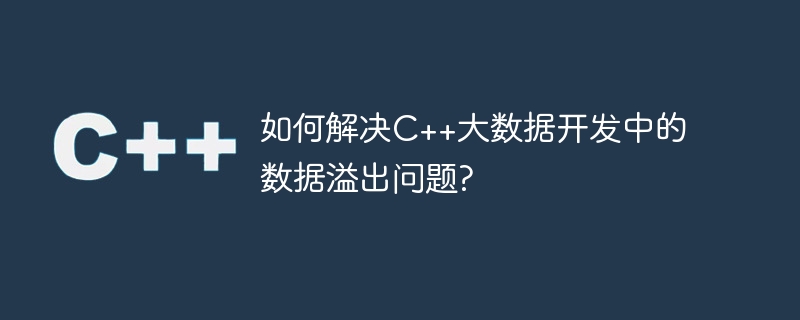

How to solve the data overflow problem in C big data development?
In the process of C big data development, we often encounter the problem of data overflow. Data overflow means that when the value of data exceeds the range that its variable type can represent, it will lead to erroneous results or unpredictable program behavior. In order to solve this problem, we need to take some measures to ensure that the data does not overflow during the calculation process.
1. Select the appropriate data type
In C, the selection of data type is very important to avoid data overflow problems. Based on actual needs, we should choose appropriate data types to store and process data. If you are dealing with a large amount of integer data, you can choose to use the long long or unsigned long long type, which can represent a larger range of integers. If you are dealing with floating-point data, you can choose the double or long double type, which can represent higher-precision floating-point numbers.
The following is a sample code that demonstrates the use of appropriate data types to avoid data overflow problems:
#include <iostream>
#include <limits>
int main() {
long long a = std::numeric_limits<long long>::max();
long long b = a + 1;
std::cout << "a: " << a << std::endl;
std::cout << "b: " << b << std::endl;
return 0;
}Run the above code, the output result is:
a: 9223372036854775807 b: -9223372036854775808
From the output result It can be seen that when the value of a is equal to std::numeric_limits<long long>::max(), that is, 9223372036854775807, for a Performs an operation of adding 1, and the value of b becomes -9223372036854775808. This is because the maximum value of the long long type will overflow after adding 1 and become the minimum value.
2. Range Check
In addition to selecting the appropriate data type, range checking is also an important step to avoid data overflow problems. Before performing numerical calculations, we should first determine whether the input data is within a reasonable range to avoid calculation results exceeding the range of the data type.
The following is a sample code that demonstrates how to perform range checking:
#include <iostream>
#include <limits>
bool isAdditionSafe(long long a, long long b) {
return a > 0 && b > std::numeric_limits<long long>::max() - a;
}
int main() {
long long a, b;
std::cout << "Enter a: ";
std::cin >> a;
std::cout << "Enter b: ";
std::cin >> b;
if (isAdditionSafe(a, b)) {
std::cout << "Addition is safe." << std::endl;
} else {
std::cout << "Addition is not safe." << std::endl;
}
return 0;
}Run the above code to determine whether the addition of the input a and b values is safe. If the addition result exceeds the range of the long long type, Addition is not safe. is output, otherwise Addition is safe. is output.
3. Overflow handling
If data overflow inevitably occurs, we can deal with the overflow problem in some ways. A common way to handle this is to use an exception handling mechanism. When an overflow occurs, an exception is thrown and handled accordingly. Another way is to perform appropriate truncation or rounding operations when overflow occurs to ensure the accuracy of the results.
The following is a sample code that demonstrates how to use the exception handling mechanism to handle overflow problems:
#include <iostream>
#include <limits>
long long safeAdd(long long a, long long b) {
if (isAdditionSafe(a, b)) {
throw std::overflow_error("Addition overflow");
}
return a + b;
}
int main() {
long long a, b;
std::cout << "Enter a: ";
std::cin >> a;
std::cout << "Enter b: ";
std::cin >> b;
try {
long long result = safeAdd(a, b);
std::cout << "Addition is safe. Result: " << result << std::endl;
} catch (const std::overflow_error& e) {
std::cout << "Addition overflow occurred." << std::endl;
}
return 0;
}In the above code, when the added result exceeds long longWhen the scope of the type is exceeded, an exception will be thrown. We can use the try-catch statement to catch this exception and then handle it accordingly. If an overflow occurs, Addition overflow occurred. will be output.
Summary:
In C big data development, it is very important to avoid data overflow problems. By selecting appropriate data types, performing range checks, and handling overflows appropriately, we can ensure that the data will not overflow during calculations and obtain correct results. In actual development, we should also optimize and improve according to specific circumstances to ensure the performance and stability of the program.
The above is the detailed content of How to solve the data overflow problem in C++ big data development?. For more information, please follow other related articles on the PHP Chinese website!
 The role of applet tag in html
The role of applet tag in html
 A complete list of commonly used public dns
A complete list of commonly used public dns
 How to open bak file
How to open bak file
 ps brightness contrast shortcut keys
ps brightness contrast shortcut keys
 Session failure solution
Session failure solution
 mobile phone screen tft
mobile phone screen tft
 The difference between static web pages and dynamic web pages
The difference between static web pages and dynamic web pages
 The difference between arrow functions and ordinary functions
The difference between arrow functions and ordinary functions




